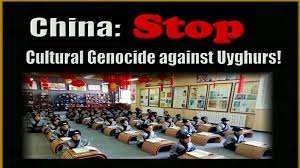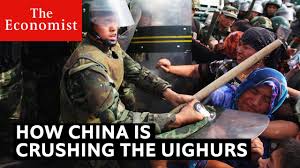
Ephraim Mirvis says: As chief rabbi, I can no longer remain silent about the plight of the Uighurs
Opinion The Guardian newspaper
An unfathomable mass atrocity is being perpetrated in China. The responsibility for doing something lies with all of us
Irecently had the privilege of speaking to Rahima Mahmut, a remarkable Uighur human rights campaigner living in London. She told me that she had always been close to her family still living in China, but that over time they became terrified of even answering her telephone calls for fear of what it might mean for them. They stopped using traditional Islamic greetings, which are forbidden, and eventually stopped answering her calls altogether. She persisted, until one day, her brother answered the phone and with a tremble in his voice, he implored her: “Leave us in God’s hands and we will leave you in God’s hands, too.”Advertisementnull
It is now nearly four years since Rahima heard those chilling parting words. She has no way of knowing what has become of her family and she lives in constant fear of what they might be enduring.
Elie Wiesel once said: “Whoever listens to a witness becomes a witness.” Having also heard similar accounts from others, and reflecting upon the deep pain of Jewish persecution throughout the ages, I feel compelled to speak out.
That responsibility is brought into sharp focus this week in prayers for the festival of Hanukah, when we recall attempts “to cause the Jewish faith to be forgotten and to prevent Jews from keeping their traditions”. These words refer back to the cruel oppression of Jews more than 2,000 years ago.
Can it be true that, in our modern, sophisticated world, men and women are still beaten if they refuse to renounce their faith? That women are forced to abort their unborn children and are then sterilised to prevent them from becoming pregnant again? That forced imprisonment, the separation of children from their parents and a culture of intimidation and fear have become the norm?
Sadly, the weight of evidence of this persecution of the Uighur Muslim minority in China is overwhelming. Satellite images, leaked documents and survivor testimonies all paint a devastating picture affecting well over 1 million people, which, for the most part, the world continues to ignore.
I have met researchers and campaigners to find out whether there might be any hope of positive change. I have written letters and raised the matter in private with key figures. With every interaction, I have been left feeling that any improvement in the desperate situation is impossible.
“Impossible” is a word I often heard while growing up in apartheid South Africa in the 60s and 70s. My father, a rabbi, would make pastoral visits to political prisoners held on Robben Island, where Nelson Mandela was imprisoned. My mother was the principal of the only training college for black nursery school teachers in the country. For so long, any notion of positive change was rendered impossible by the impregnable power and ruthless determination of the apartheid authorities. And, yet, change did eventually come.
“Impossible” was the sad conclusion when, during my tenure as chief rabbi of Ireland in the 1980s, my wife and I were actively involved in the global campaign for Soviet Jewry. The oppression of so many Jews and others by the mighty Soviet Union seemed an insurmountable injustice. It appeared impossible that protesters around the world could change the fortunes of innocent men and women who were sent to labour camps for the sin of living as Jews. But change did eventually come.
Last week marked the 72nd anniversary of the Universal Declaration of Human Rights on 10 December 1948. On 9 December that same year, the convention on the prevention and punishment of the crime of genocide was also adopted. Both documents, which stand among humanity’s most vital legal and moral proclamations, are at risk of fading into the political periphery if we are not prepared to act upon them.
The freedoms we enjoy, coupled with a perception that nothing we do will help, often create a culture of apathy. Time and again, history has taught us that it is precisely such apathy that permits hatred to flourish. The Talmud teaches that: “We are not expected to complete the task, but neither are we free to desist from it.”Lords vote to revoke UK trade deals with countries committing genocideRead more
Nowhere was the truth of this lesson more evident to me than in the reaction of decent people to apartheid and the Soviet Union. Somehow, with every newspaper headline and with every new ally, what had once seemed impossible eventually became inevitable. Change eventually came because, over time, ordinary people spoke out, even when those suffering were of another faith, unknown to them and living on the other side of the world. That is how we can bring change for Uighur Muslims.
It is clear that there must be an urgent, independent and unfettered investigation into what is happening. Those responsible must be held to account and Uighurs able to escape must be given asylum.
Alongside these responses and to help bring them about, every one of us shares in the responsibility to act. Today I urge you to write to your MP. Write letters to the press. Write to the companies that have been linked to Uighur forced labour. Take to social media. Talk to your friends about what is happening and encourage them to do the same. Let no person say that the responsibility lies with others.
At this very moment, an unfathomable mass atrocity is being perpetrated. Though the task is great, none of us are free to desist from it. As Nelson Mandela himself said: “It always seems impossible until it’s done.”
• Ephraim Mirvis is an Orthodox rabbi who serves as the chief rabbi of the United Hebrew Congregations of the Commonwealth


